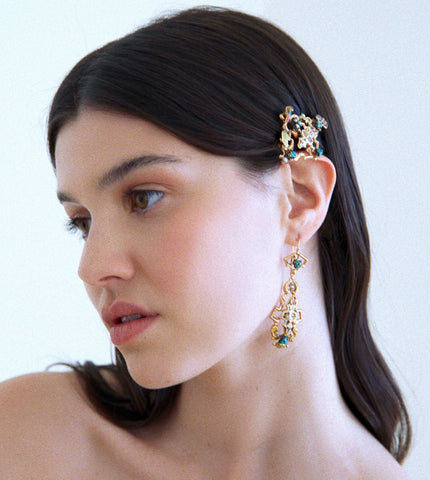Associated with the natives of December, turquoise varies from green to sky blue, although it is best known for the blue-green colour that gives the hue its name. The colour varies according to the proportion of copper and iron in the mineral, and therefore the source.

Antique gold, turquoise and enamel set
Etymology and origin of turquoise
In fact, the name "turquoise" is derived from the Old French turquois, which means "Turkish". This is a sort of abuse of language: if it was indeed imported into Europe by the Turks, turquoise actually comes from Persia - so we challenge you to rehabilitate Persian.
It is also found in ancient Egypt and in America (Mexico, USA). It forms in semi-desert environments, on volcanic rocks through which water occasionally flows during the short rainy season - and PAF, that makes turquoise.

Named after the mine that produces deep blue turquoise. Did you really think we were leaving anything to chance? At Galerie Pénélope, we know our subjects inside out (adorned with jewels). Don't rush to Arizona, the mythical vein is exhausted. On the other hand, for the budding Indiana Joneses, deposits have recently been rediscovered in Armenia.
In America, turquoise was used by the Indians - it seems that, in addition to its ornamental use, the stone was used as a currency of exchange. Moreover, American Indian jewellery made of turquoise and silver is in the collective imagination. In South America, for example, turquoise can be found on religious artefacts from the Aztec Empire - take a look at the Xiuhtecuhtli mask if you have a good heart.

Closer to us geographically, the pharaohs of ancient Egypt already adorned themselves with turquoise jewellery. The stone has many symbols depending on the era: power of life and the gods according to the Aztecs, stone of the divine and of renewal for the Egyptians; it also brings luck and protection.
Great popularity in the 19th century
"Fashion is an eternal restart" says the adage. Turquoise experienced a comeback in the 19th century: turquoise jewellery was particularly popular in the 1840s.

The 19th century was also the century of romanticism and naturalism - it was during this period that the expression "blue flower" was invented, inspired by Novalis' novel Henri d'Ofterdingen in 1802. It was also the time of sentimental jewellery and the reinvention of the language of flowers. Turquoise is systematically associated with forget-me-nots.
Finally, the Napoleonic campaigns in Egypt at the end of the 18th century gave rise to a craze in the West for the atmosphere of the Thousand and One Nights. This is the era of theEgyptomania - This is the era of the "Arabian Nights", about which you already know a lot thanks to our article! and the era of orientalism in painting. Ingres and Delacroix, to name but two, transported us to a fantasized Orient. Well, and they found a way to paint naked women in lascivious poses, let's not be fooled.

Turquoise also had its moment of glory in the 1970s (eternal recommencement, we told you) with the emergence of the hippie movement and the democratisation of travel, particularly to "the Indies". With Chanel dedicating its Métiers d'Art 2018 collection to the sexy Egypt of the pharaohs and Cleopatra, we bet turquoise is back in the spotlight? Get a head start!

Find our complete selection of jewellery in the drop-down menu on the right (or below in mobile version).
As turquoise has the particularity of turning green when in contact with the skin, find our advice for care for your jewellery.
Finally, don't be jealous if you are not born in December, find out here your birthstone.
antique-marquise-gold-turquoise ring: antique-marquise-diamond-turquoise ring: antique-marguerite-turquoise-diamond ring : turquoise flower ring; marquise
